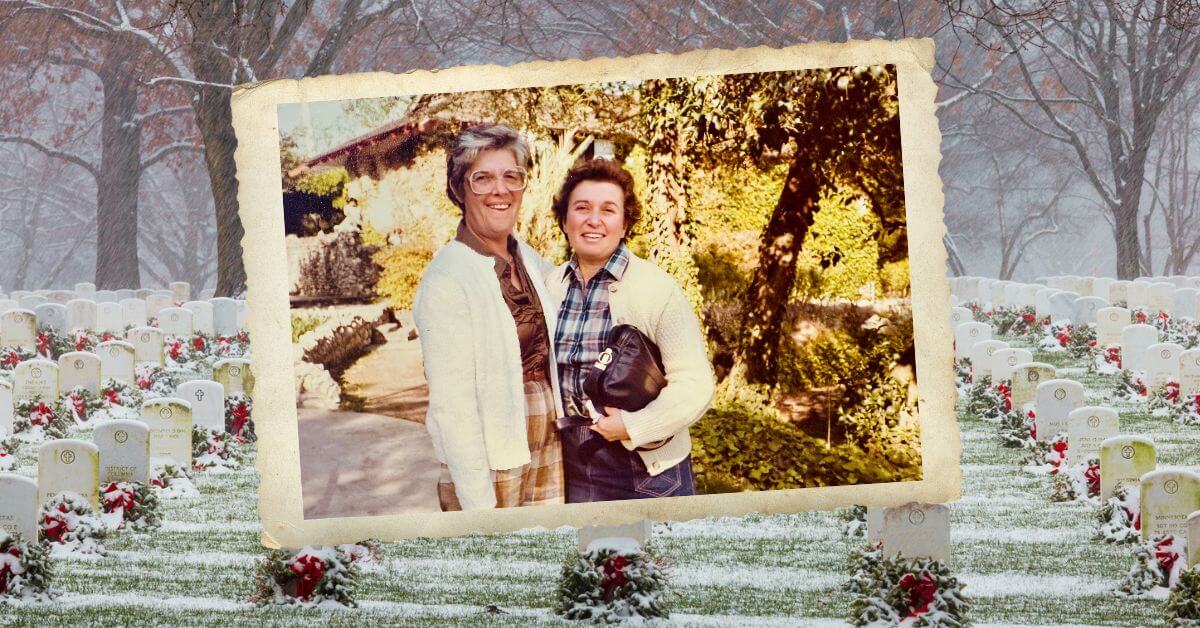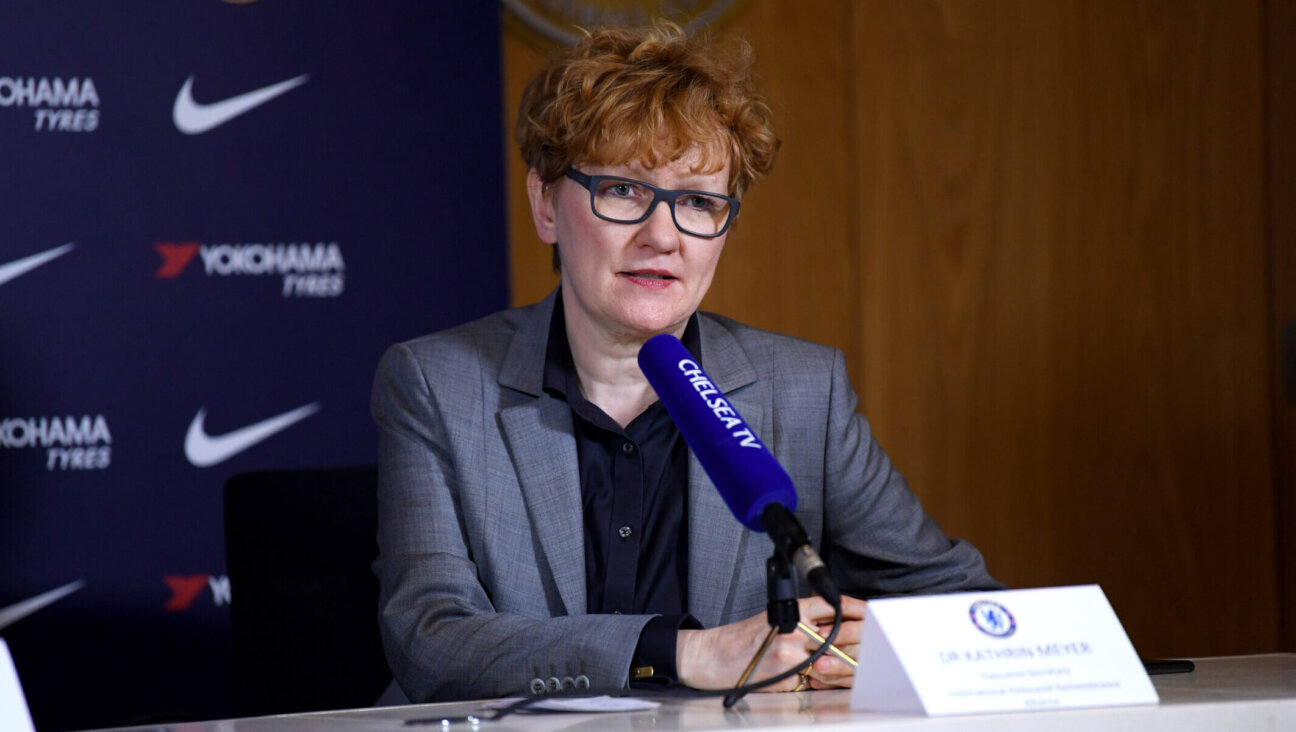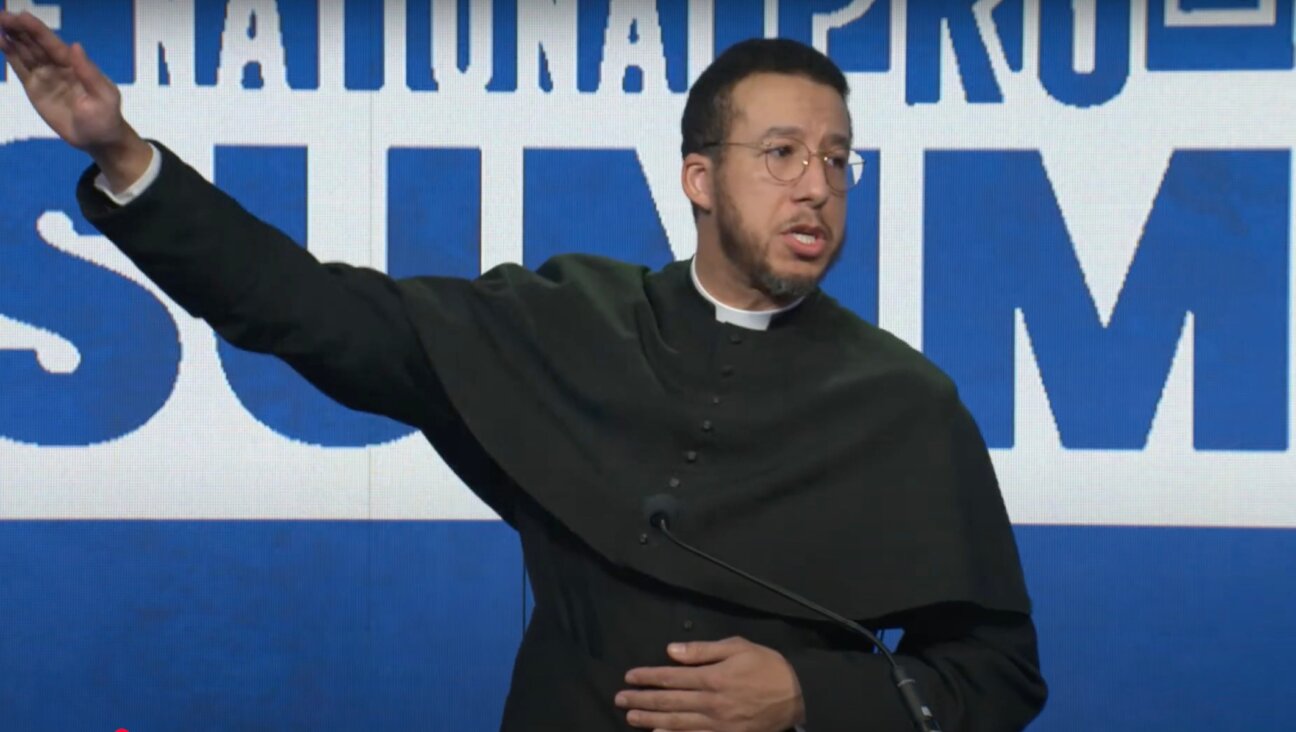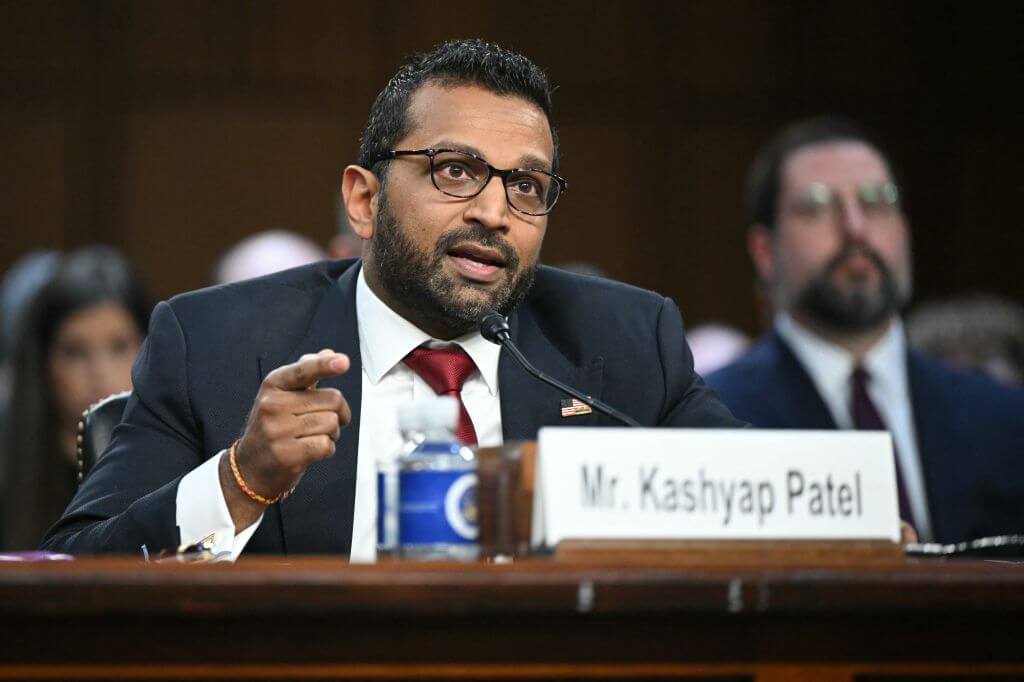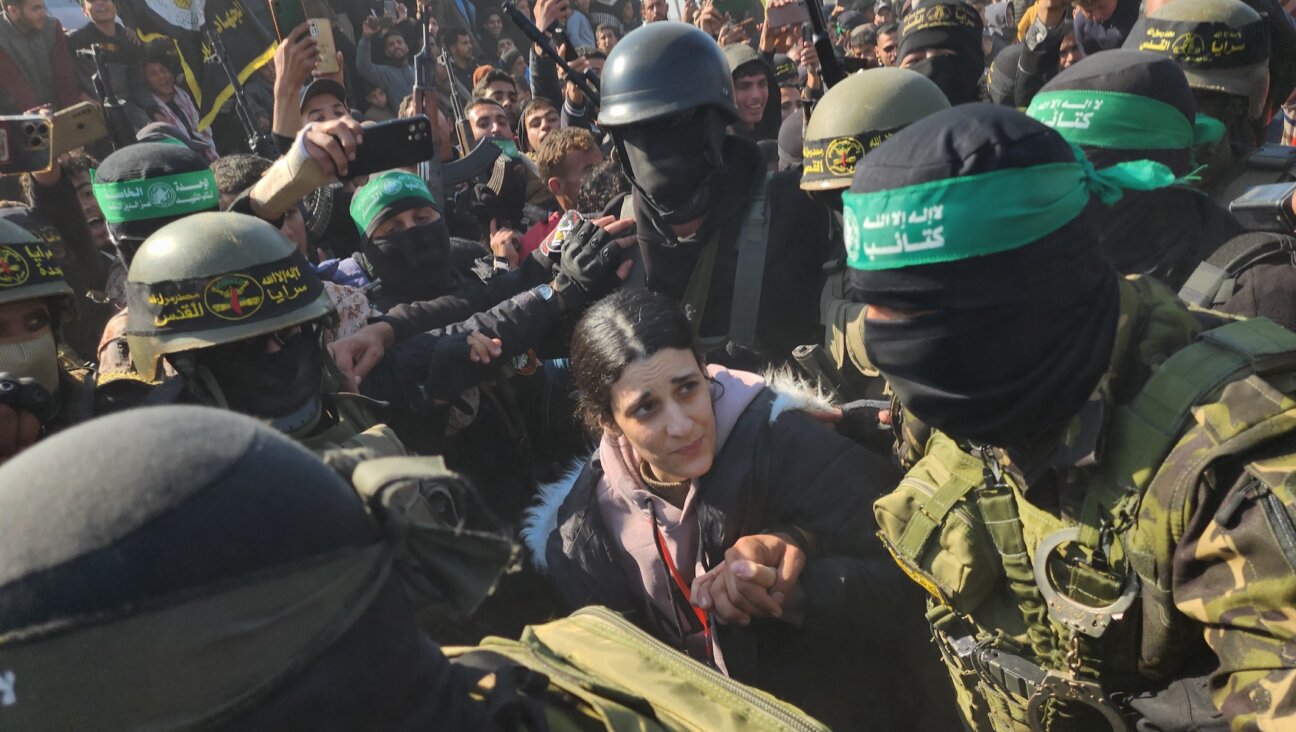‘Mein Kampf’ No Longer Banned in Germany — Now What?

Image by Getty Images
Nazi salutes, swastikas and other Third Reich symbols have long been outlawed in Germany. But as of midnight on New Year’s Eve, “Mein Kampf,” Hitler’s infamous autobiographical tome, was off the list of suppressed Nazi icons.
As a result, “Mein Kampf” will again hit bookstores in Germany, 70 years after its author’s death at the end of World War II. Its release to the public is due to a legal technicality; with the lapse of its copyright, the book has slipped into the public domain.
From 1945 until now, the state of Bavaria in southern Germany has controlled the rights to “Mein Kampf,” whose first volume was published in 1925. With its copyright control, Bavaria enforced an unofficial ban on the book, albeit one from which educators and scholars were selectively exempted. But with the lapse of the copyright, anyone is now free to publish the original text.
Some Jewish groups in Germany see this as a troubling development, one that could potentially fuel ethnic and religious hatred, perhaps even leading to acts of violence. “‘Mein Kampf’ must remain prohibited,” runs a recent statement from Josef Schuster, president of the Central Council of Jews in Germany, the main administrative body of German Jews. “Law enforcement authorities should rigorously prosecute the distribution and sale of the book,” declared the statement, which was posted on the council’s website.
In anticipation of the book’s copyright lapse, the Munich-based Institute of Contemporary History has spent the past three years working on a 2,000-page annotated edition with the hope of preempting others that that may simply present Hitler’s ideas, without comment, at face value. When it appears in bookstores in January, this will be the first edition of “Mein Kampf” published in Germany since 1945.
“Perhaps never in history did a ruler write down before he came to power what he was to do afterwards as precisely as Adolf Hitler,” the historian Eberhard Jäckl wrote, explaining the scholarly value of “Mein Kampf,” in which Hitler, among other things, explained his views of Jews as an absolute evil on earth that must be eliminated.
Given the long shadow that the Nazi era casts on Germany’s history, it is hardly surprising that the project has not been without controversy. In 2012, the Bavarian government set off a storm when news broke that it had donated 500,000 euros — almost $633,000 at the time — to the project of preparing the new, annotated edition. The state’s minister of culture said that any reprint of “Mein Kampf” would cause distress to survivors. Another government official threatened legal action against the Institute of Contemporary History. Bavaria allowed the historians to continue their work, but withdrew its funding for the project a year later.
The annotated edition has also raised some eyebrows in the academic community. Leading figures like Wolfgang Benz, founder of the Center for Research on Anti-Semitism at the Technical University of Berlin, argue that Hitler’s racist invective outweighs the scholarly merit of any edition, however carefully prepared. In 2012, the German magazine Der Spiegel quoted him describing “Mein Kampf” as “personal, hate-filled tirades without any additional insight,” and hence unworthy of serious academic attention.
Reactions from Jewish leaders have been mixed. Despite his view that the book, on its own, remains off limits, Schuster did not object to the critical edition, since “knowledge of ‘Mein Kampf’ continues to be important in order to explain National Socialism and the Shoah.” He lauded the Munich historians for “contrasting Hitler’s racial theories with scientific findings” in their 3,500 footnotes, and said he welcomed the volume “to be at the disposal of research and teaching.”
But the head of Munich’s Jewish community, Charlotte Knobloch, told The Associated Press that even with annotations, the original text of “Mein Kampf” remains dangerous. “It could still have an impact, because both of the core ideas are timeless: ultra-nationalism and racism,” the 83-year-old Holocaust survivor said.
Knobloch also objected strongly to a recommendation of the German Teachers’ Association, which represents more than 160,000 educators, that the critical edition be taught in high school. The association’s president, Josef Kraus, recently called on teachers to use the critical edition to “inoculate adolescents against political extremism,” according to a report by the German business newspaper Handelsblatt.
Even with the ban that has been in place in the book’s country of origin, “Mein Kampf” is one of the best-selling books of all time. More than 12 million copies were sold by the end of WWII alone. This included millions that were bought by the Nazi state and given to newlywed couples (a strategy that helped to make Hitler wealthy). For the generations of Germans born postwar, however, the book’s forbidden status has, perhaps inevitably, produced a certain morbid curiosity, if not a fascination. In numerous interviews, Christian Hartmann, the historian overseeing the critical edition, has compared his team of scholars to a bomb disposal squad. “The idea is to defuse the book with a new introduction and especially with a thorough scholarly commentary. This removes the book’s symbolic value and makes it what it essentially is: a historical record, and nothing more,” he told Der Spiegel in 2012.
For Arnd Bauerkämper, a professor of modern European history at the Free University of Berlin, “the discussion has been become a little artificial by now.” He pointed to debates about publishing the whole of “Mein Kampf”— rather than excerpts in history books — that have roiled Germany since the 1980s—even as the advent of the Internet made the book widely available.
Bauerkämper called for a levelheaded assessment. “We should not underestimate ‘Mein Kampf,’ nor should we overestimate it,” he explained. “It should be taken seriously, because it tells a lot about Hitler’s worldviews.”
Bauerkämper told the Forward that he welcomed the critical edition, which, he said, will show that many of Hitler’s ideas were hardly original, but were rather part of an established intellectual stream that included anti-liberalism and Social Darwinism. “The point of the edited version is to prevent misuse and exploitation,” he added.
With the hefty price of 59 euros, or $64, and an initial run of 3,500–4,000 copies, it seems unlikely that the critical edition will fly off shelves. It remains to be seen whether editions of the uncommented text will start appearing in German bookstores, especially since Bavaria is reportedly trying to find a legal way ban future nonscholarly printings.
Helgard Kramer, a sociologist and expert on National Socialism, considers it unlikely that publishing houses will get rich by running off cheap copies of the book, let alone that “Mein Kampf” will once again become a best-seller in Germany.
“Publishers cannot make a quick buck with a book which is so easily available,” she told the Forward in an email, referring to the book’s presence on the Internet. And while a certain mystique may have formed around “Mein Kampf” due to its long suppression, she finds it unlikely that the book will find an appreciative readership in today’s German mainstream. “I read the book again last year, and this is really hard work, since it is so disgusting to read,” she wrote.
Contact A.J. Goldmann at [email protected]
A message from our Publisher & CEO Rachel Fishman Feddersen

I hope you appreciated this article. Before you go, I’d like to ask you to please support the Forward’s award-winning, nonprofit journalism so that we can be prepared for whatever news 2025 brings.
At a time when other newsrooms are closing or cutting back, the Forward has removed its paywall and invested additional resources to report on the ground from Israel and around the U.S. on the impact of the war, rising antisemitism and polarized discourse.
Readers like you make it all possible. Support our work by becoming a Forward Member and connect with our journalism and your community.
— Rachel Fishman Feddersen, Publisher and CEO










